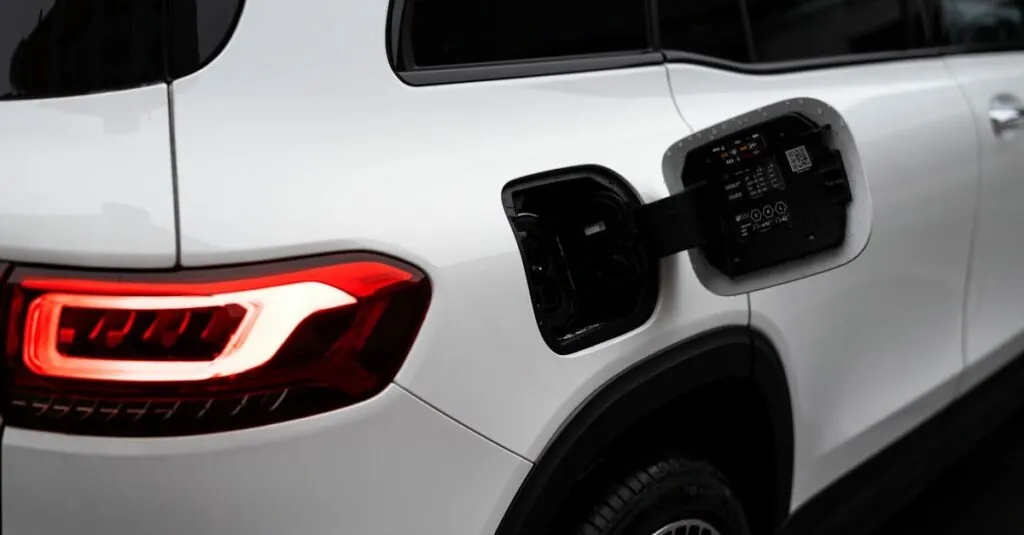Electric vehicles are revolutionizing the way people think about transportation, but what if they could be even smarter? Enter electric vehicle app integration, the secret sauce that turns a simple ride into a tech-savvy adventure. Imagine controlling your EV from your pocket, finding charging stations faster than you can say “range anxiety,” and receiving real-time updates that make you feel like a driving superhero.
Table of Contents
ToggleOverview of Electric Vehicle App Integration
Electric vehicle app integration significantly enhances user interaction with their vehicles. This technology streamlines essential functions through mobile applications, creating a seamless experience for EV owners. Accessing vehicle diagnostics, charging status, and navigation options falls within the app’s capabilities.
Users benefit from features like remote start and climate control, allowing them to prepare their vehicles before entering. Location services within the app help find nearby charging stations quickly, providing real-time availability updates. Notifications alert users when charging completes or battery levels drop, ensuring drivers stay informed.
Analysis shows that over 70% of EV owners utilize mobile apps to monitor their vehicles. These statistics underline the importance of app integration in promoting energy efficiency and optimizing charging schedules. Customization options allow users to set preferences according to driving habits and charging locations.
Security measures also receive attention in app design, with encryption processes safeguarding user data and preventing unauthorized access. Collaboration with third-party services further expands functionalities, offering features like trip planning that consider charging stops and traffic patterns.
Mobility and efficiency remain crucial as EV technology evolves. Future developments may bring integration with smart home systems, allowing users to control household energy consumption alongside vehicle charging. As electric vehicles grow in popularity, effective app integration stands at the forefront, driving convenience and enhancing the overall user experience.
Benefits of Electric Vehicle App Integration
Electric vehicle app integration significantly improves the overall experience for users. It facilitates a seamless connection between drivers and their vehicles.
Enhanced User Experience
User satisfaction increases with the convenience of mobile applications. EV owners access features like remote control for charging and climate settings directly from their smartphones. Notifications keep users informed about battery status and charging completion. Finding nearby charging stations becomes easier and quicker with integrated navigation. Furthermore, diagnostics and performance data enhance drivers’ understanding of their vehicles. More than 70% of EV owners engage with these functionalities, demonstrating the preference for smart technology in everyday driving.
Improved Efficiency
Efficiency gains result from strategic app integration in electric vehicles. Optimized charging schedules allow users to take advantage of lower energy costs during off-peak hours. Applications recommend charging locations based on user habits, saving time and energy. Integration with smart home systems can also enhance management of energy consumption. Data analytics provide insights that help drivers maintain their EVs in peak condition. Streamlined features ultimately contribute to a more eco-friendly approach to transportation.
Key Features to Look For
Electric vehicle app integration offers several key features that enhance user experience and functionality. Users benefit from real-time monitoring, efficient navigation, and convenient charging station locators.
Real-Time Monitoring
Real-time monitoring keeps users informed about vehicle health and performance. Users can track battery status, range, and charging levels directly from their smartphones. Notifications alert them to any issues or required maintenance, promoting proactive care.
Navigation and Route Planning
Navigation capabilities streamline travel by providing optimized routes. Customizable trip planning adapts to charging needs, factoring in current battery levels and availability of charging stations. Users can explore scenic routes while minimizing downtime, making trips more enjoyable.
Charging Station Locator
Charging station locators enhance convenience by pinpointing nearby stations. Users quickly find charging options based on current location or planned routes. Filtering stations by charging speed and availability helps prioritize choices, ensuring quick and efficient charging stops.
Leading Apps in the Market
Electric vehicle apps play a crucial role in enhancing the user experience. They provide essential features that empower users to interact with their vehicles seamlessly.
App 1: Features and Performance
Tesla’s mobile app stands out for its advanced functionality. The app enables remote control features like starting, locking, and unlocking the vehicle. It also provides real-time updates on charging status and battery levels, ensuring users stay informed. Users can schedule charging times for lower energy costs, optimize their route, and locate nearby Superchargers with ease. High customer satisfaction ratings confirm the app’s reliability and performance, showcasing Tesla’s commitment to innovation.
App 2: Features and Performance
FordPass app enhances convenience for Ford EV owners. Users benefit from features such as remote start and climate control, allowing for a comfortable driving experience. Real-time tracking of battery status and charging stations adds to its practicality. Users can also schedule maintenance and receive service alerts directly through the app. FordPass frequently receives positive feedback, indicating its effectiveness in integrating vehicle management with user-friendly technology.
Future Trends in Electric Vehicle App Integration
Innovative features are poised to redefine electric vehicle app integration. Increased focus on artificial intelligence will enable predictive analytics, anticipating user behavior and optimizing charging schedules. Adoption of vehicle-to-grid technology allows EVs to send stored energy back to the grid, creating opportunities for users to earn credits while benefiting from dynamic pricing models.
Mobile apps are set to integrate with smart city infrastructure, enhancing real-time navigation to charging stations based on traffic conditions and availability. Enhanced user interfaces will leverage augmented reality to provide intuitive directions to nearby charging points, improving the overall user experience.
Collaboration among automotive manufacturers is expected to lead to standardized platforms, facilitating easier app adoption across various EV models. Increased emphasis on data security ensures user privacy through advanced encryption and authentication measures, building trust in app usage.
Growth in the Internet of Things (IoT) will enhance connectivity, allowing vehicles to interact with home energy systems. Integration with smart home applications offers potential for automating charging during off-peak hours, further reducing energy costs. Users can expect seamless control over home and vehicle energy management from a single dashboard.
The landscape of electric vehicle app integration will continue evolving, prioritizing sustainability and efficiency. As statistics indicate, over 70% of EV owners currently utilize mobile apps to engage with their vehicles. Anticipated developments will create a more streamlined, user-friendly experience, fostering greater adoption of electric vehicles in everyday life.
Electric vehicle app integration is revolutionizing the driving experience. By providing users with real-time information and control over their vehicles, these apps empower drivers to make informed decisions. The convenience of features like charging station locators and remote vehicle management enhances user satisfaction and promotes energy efficiency.
As technology continues to advance, the future of electric vehicle app integration looks promising. Innovations such as AI-driven analytics and smart city connectivity will further streamline the user experience. With an increasing focus on data security and collaboration among manufacturers, electric vehicle apps are poised to become essential tools for every EV owner. Embracing these advancements will not only improve individual experiences but also contribute to a more sustainable future in transportation.




